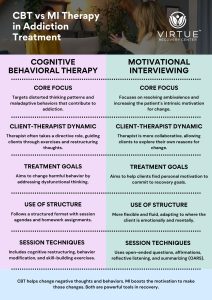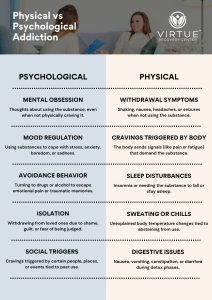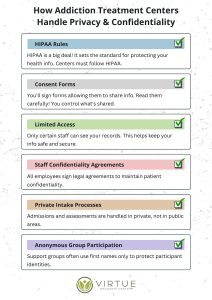Key Takeaways
- Schema Therapy (ST) helps individuals understand and change negative thought patterns that contribute to addiction.
- Early maladaptive schemas—deep-rooted beliefs formed in childhood—often lead to addictive behaviors.
- Schema Therapy combines cognitive, behavioral, and experiential techniques to address underlying emotional struggles.
- ST is particularly effective for individuals with addiction and co-occurring personality disorders.
- Virtue Recovery Las Vegas offers comprehensive addiction treatment, including Schema Therapy.
Introduction
Addiction is more than just a dependence on substances—it often has deep emotional and psychological roots. Many individuals struggling with addiction use substances as a way to cope with unresolved emotional pain, trauma, or negative self-beliefs. Without addressing these deeper issues, long-term recovery becomes much more difficult. Schema Therapy (ST) is a specialized form of psychotherapy that helps individuals uncover and change harmful thought patterns that contribute to addiction. Unlike traditional therapies that focus primarily on behavior, Schema Therapy works by identifying and reshaping deep-rooted beliefs that were formed in childhood or early life experiences. These beliefs, or schemas, influence how individuals see themselves and the world around them, often leading to self-destructive behaviors such as substance abuse. By working through these maladaptive schemas, individuals can gain a deeper understanding of their addiction, develop healthier coping mechanisms, and create lasting change.Understanding Schema Therapy and Its Role in Addiction Treatment
Schema Therapy was originally developed to treat personality disorders, but research has shown it to be highly effective for individuals struggling with addiction. Many people with substance use disorders have deeply ingrained negative beliefs about themselves, often formed in childhood due to neglect, trauma, or emotional deprivation. For example, someone who has always felt abandoned may develop a schema of abandonment, leading them to believe that everyone they love will eventually leave them. This belief can cause intense emotional distress, and rather than addressing it in a healthy way, they may turn to drugs or alcohol to numb the pain. Over time, this pattern of avoidance and self-medication strengthens the addiction, making it harder to break free. Schema Therapy helps individuals recognize and challenge these negative schemas, replacing them with healthier and more constructive thought patterns. By addressing the root causes of addiction, Schema Therapy provides a deeper level of healing that goes beyond simply stopping substance use.How Schema Therapy Works in Treating Addiction
Schema Therapy is a structured and integrative approach that combines elements of Cognitive Behavioral Therapy (CBT), psychodynamic therapy, and experiential techniques. The goal is to help individuals identify, understand, and change the negative schemas that drive their addictive behaviors. Therapists work closely with individuals to explore their maladaptive schemas, such as beliefs about being unworthy, defective, or unlovable. Through guided discussions and exercises, individuals begin to see how these beliefs influence their choices and actions. Once they recognize these patterns, they can start replacing them with healthier, more constructive beliefs that support their recovery. A key component of Schema Therapy is addressing schema modes, which are different emotional states or coping mechanisms that individuals adopt in response to their schemas. Some people fall into a vulnerable child mode, where they feel helpless and overwhelmed, while others develop a detached protector mode, where they emotionally shut down to avoid pain. These modes often lead to self-destructive behaviors, including substance abuse. To help individuals shift out of these unhealthy modes, Schema Therapy incorporates experiential techniques such as guided imagery and role-playing. These methods allow individuals to process their emotions in a deeper way, helping them develop healthier coping strategies and a more positive self-image.The Effectiveness of Schema Therapy for Addiction
Schema Therapy has been shown to be particularly beneficial for individuals who struggle with chronic relapse, emotional instability, or co-occurring personality disorders. Many traditional addiction treatments focus on managing behaviors, but Schema Therapy goes deeper by addressing the underlying emotional wounds that fuel addiction. One of the primary reasons Schema Therapy is so effective is that it helps individuals develop emotional regulation skills. Many people who struggle with addiction have difficulty managing intense emotions, leading them to rely on substances as a form of escape. Schema Therapy provides individuals with tools to recognize, understand, and process emotions in a healthier way, reducing their reliance on drugs or alcohol as a coping mechanism. Another major benefit of Schema Therapy is its focus on self-compassion and self-acceptance. Many individuals in recovery carry a deep sense of shame or self-hatred, which can make it difficult to stay motivated in treatment. By helping individuals challenge these negative self-perceptions, Schema Therapy fosters a greater sense of self-worth and resilience, both of which are essential for long-term recovery. Schema Therapy also encourages individuals to develop stronger relationships and social connections. Since many maladaptive schemas are related to feelings of rejection, abandonment, or mistrust, therapy helps individuals build healthier interpersonal skills and emotional intimacy. This not only improves their relationships but also reduces feelings of isolation, which is a common trigger for relapse.Schema Therapy at Virtue Recovery Las Vegas
Virtue Recovery Las Vegas offers Schema Therapy as part of a comprehensive addiction treatment program. Our experienced therapists use Schema Therapy to help individuals:- Identify and heal early maladaptive schemas.
- Develop emotional resilience and healthier coping mechanisms.
- Strengthen their sense of self-worth and confidence.
Conclusion
Addiction is often driven by deep-seated emotional wounds and negative thought patterns that are difficult to break without professional intervention. Schema Therapy provides a powerful approach that not only helps individuals overcome addiction but also heals the underlying emotional pain that contributes to substance abuse. By addressing maladaptive schemas, teaching emotional regulation skills, and fostering self-compassion, Schema Therapy offers individuals the chance to achieve lasting recovery. Unlike some traditional therapies that only focus on behavior, Schema Therapy works on transforming the way individuals see themselves and interact with the world. If you’re ready to take control of your life and build a future free from addiction, Virtue Recovery Las Vegas is here to help. Call 866-520-2861 today to speak with a specialist and take the first step toward a healthier, addiction-free life.How Does Schema Therapy Compare to CBT and MI in Treating Addiction?
Schema therapy offers a deeper exploration of emotional patterns compared to cbt and mi for addiction therapy. While cognitive-behavioral therapy (CBT) and motivational interviewing (MI) focus on changing behaviors and enhancing motivation, schema therapy addresses underlying beliefs that contribute to addictive behaviors, making it a comprehensive alternative.













